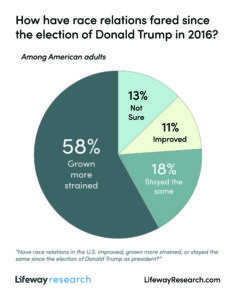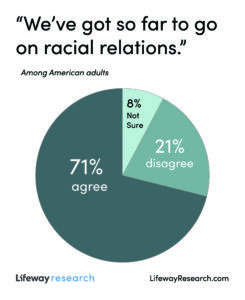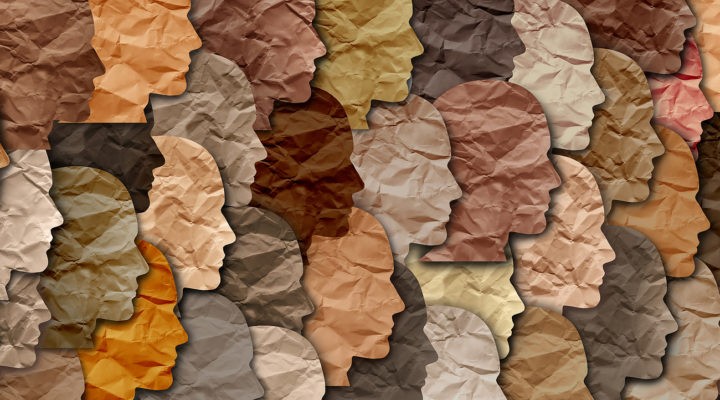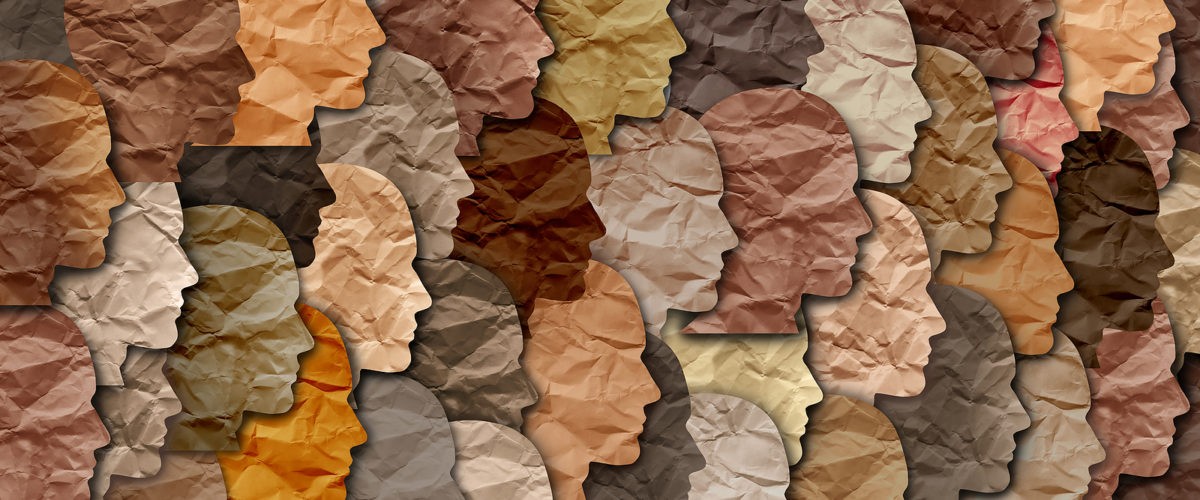Most Americans say race relations took a significant hit during the past four years, and almost a quarter believe clergy have failed to exert a positive influence on the trend, new research shows.
“Fewer Americans believe our nation has made significant progress in race relations, and a majority say things grew worse under Donald Trump’s presidency,” Lifeway Research reported.
 Lifeway compared similar 2014 research against new polling administered just before the 2020 presidential election. Both polls asked participants if the nation is making progress on race relations.
Lifeway compared similar 2014 research against new polling administered just before the 2020 presidential election. Both polls asked participants if the nation is making progress on race relations.
“Today, 46% say we have made worthwhile progress — 28 points fewer than in 2014 when 74% said the same,” Lifeway said in an online summary of its project. “Americans are also twice as likely to disagree than in 2014. Today, 46% don’t believe we have come a long way on race relations, while it was 23% in 2014.”
Lifeway Research Executive Director Scott McConnell said a new research approach adopted since the earlier survey may add an element of uncertainty about the meaning of the comparative results.
“With a change in methodology from telephone in 2014 to online, we cannot say definitively if this decreased optimism is an actual change in sentiment or increased forthrightness,” McConnell said. “Regardless, optimism on race relations is lower than we previously thought.”
The study also sought to determine the role played by politics, religion and ethnicity in views of the widening racial gulf in the U.S.
One trend uncovered was that 58% of Americans “say race relations in the country grew more strained since the election of Trump as president, while 18% say things have stayed the same and 11% say relations have improved.”
Blacks were most likely to make the connection between Trump and deteriorating race relations, at 72%. Hispanics and whites agreed at 61% and 54%, respectively, making white Americans the least likely to say race relations have deteriorated.
The connection between religious affiliation and race relations also was examined, as were the perceived roles of clergy.
“Among Christians, the more often they attend church services, the more likely they are to believe religious leaders play a positive role in race relations,” Lifeway said, while “more than a quarter of the non-religious and young adults don’t see it.”
 Matters of faith also shaped responses to a question posed in the survey: “We’ve come so far on race relations.”
Matters of faith also shaped responses to a question posed in the survey: “We’ve come so far on race relations.”
“Religiously unaffiliated Americans are the religious group least likely to agree with the statement (38%),” Lifeway reported. “Among Christians, those who attend at least monthly (57%) are more likely than those who attend less frequently (39%) to believe the nation has come a long way on race relations. Americans with evangelical beliefs are more likely to agree (58%) than those without such beliefs (43%).”
The ethnicity of survey participants also shaped responses, with 51% of whites perceiving that “significant progress” has been made on race relations since 2014. By comparison, 66% of African Americans disagreed with that assessment.
Lifeway also found that whites overall expressed a dim view of the value of racial diversity. “The percentage of white Americans who see diversity as good fell almost 20 points (85% in 2014 to 66% today).”
Opinions were slightly higher, but still troubling, for the population as a whole. Lifeway said 69% of Americans describe diversity as a positive for the nation. “This is down from 2014 when 82% of Americans said they believed our nation’s racial diversity was beneficial.”
And whether churches were seen as too segregated was determined in part by age and race, Lifeway reported. “Americans are divided over whether U.S. churches are too segregated. More than 2 in 5 (42%) believe that to be true, while 36% disagree and 22% aren’t sure.”
Among adults 18 to 34 years old, 46% were more likely to view churches as too segregated. Among adults 50 and older, 38% agree with that view.
“Slightly more than a third of Protestants (37%) believe churches are too segregated, the lowest among religious groups,” the report said. “The religiously unaffiliated (48%), other religions (47%) and Catholics (45%) are all more likely to say congregations are too racially segregated.”
Whatever their disagreements, a significant majority of Americans, at 71%, agreed that the nation has a long way to go in improving racial relations, Lifeway officials noted.
But even that statistic is tempered when compared to previous research: “The portion of those who believe we have much further to go is down from 81% in 2014. Among African Americans, however, 81% still agree that the U.S. has a long way to go.”


